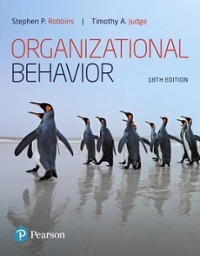Most of the time, we have good intentions when we try to reward others. We might give
Question:
Most of the time, we have good intentions when we try to reward others. We might give a bonus to an employee who has done an exceptionally good job all year. Or our reward systems might be a little more institutionalized. For example, a movie theater might reward an employee for eliciting charity donations from moviegoers, or a realtor might receive a commission for each house she sells.
Sometimes, however, even with good intentions, we may be rewarding the wrong thing. In a classic article of the same title, Steven Kerr outlines this “Folly of Rewarding A, While Hoping for B.” For example, if you go to the doctor’s office, the doctor can make two types of errors:
(1) pronouncing you well when you are actually sick
(2) pronouncing you sick when you are actually well.
If the doctor commits the first error, the consequences are grave—there could be a threat of a lawsuit, malpractice, or negligence. If the doctor commits the second error, the consequences have much less of an impact—the doctor generates more income, establishes a more regular customer base, and is rewarded by society for taking a “conservative” approach to diagnosis. These reward and punishment differences persist, even when there is the chance that treatment without due cause can cause more harm than good. However, shouldn’t society seek to minimize both types of errors and instead seek medical diagnostic accuracy as a goal?
In a more recent example, one study found that a monthly perfect attendance award program across five industrial laundry plants did not work the way it was intended to: When participants became ineligible for the award, they showed up less frequently. The employees became so focused on attendance that their efficiency decreased by 8 percent because many of them would become ineligible for the reward after coming in late or missing a day during the month period. The plant was rewarding attendance and hoping for good performance.
Questions
1. How do you think we might be able to recognize when we are rewarding the wrong thing? What steps can organizations take to recognize these instances?
2. Is rewarding the unintended behavior or outcome always unethical? Why or why not?
3. Do you think it is possible for a reward program to start out rewarding the appropriate behavior at its inception but then begin to reward the wrong thing over time? Why or why not?
Step by Step Answer:

Organizational Behavior
ISBN: 9780134729329
18th Edition
Authors: Stephen RobbinsTimothy JudgeTimothy Judge, Timothy Judge





